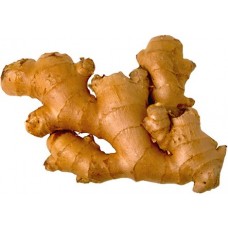Known in hindi as ”adarakh”, Ginger is consumed as delicacy, medicine or
spice.
When selecting ginger at the store, look for firm, heavy hands --
that’s what the rhizomes are called -- and pass on any that look wrinkled or
show signs of mold.
Look for smooth skin (wrinkles indicate that the root is dry and
past prime) with a fresh spicy aroma.
- While buying ginger, always choose fresh ginger over
the dried form as it is not only superior in flavor, but also contains higher
levels of gingerol and ginger’s active protease.
- While purchasing fresh ginger root, make sure that it
is firm, smooth and free of mold.
- If you are looking for dried ginger powder, explore the
local spice stores in your area that offer a wide variety of dried herbs
and spices of superior quality and freshness compared to those offered in
regular markets.
- While buying dried ginger powder try to select
organically grown ginger as it will give you more assurance that it is not
irradiated.
- Ginger is available in a variety of forms, including
crystallized, candied, and pickled ginger.
It has a host of minerals and a few vitamins. These include calcium,
iron, magnesium, manganese, potassium, selenium and sodium. Vitamins C, E and
B6 are found in the rhizome.
- Ginger is known to have carminative properties and
hence, is used for calming troubled stomach and providing relief to
bloating and gastric problems.
- Ginger is very helpful in cases of cough and itchiness
of the throat by stimulating the secretion of mucus, thereby alleviating
the problem.
- Since ginger promotes mucus secretion, it further
prevents the development of ulcers and unwanted holes along the lining of
the stomach.
- Ginger has several anti-viral, anti-toxic, and anti-fungal
properties, and is very effective in preventing and treating common cold.
- It is very helpful in several cases of nausea, caused
due to seasickness, morning sickness, motion sickness and as a side effect
of chemotherapy.
- Ginger has anti-inflammatory properties and can be very
effective in the treatment of rheumatoid arthritis, osteoarthritis and
various other muscular disorders.
- Ginger contains special enzymes which enhance the
catalysis of proteins in the food, thus helping in digestion and prevention
of cramps and diarrhea.
- Researches indicate that ginger helps in lowering
cholesterol levels and prevents the formation of blood clots.
- Ginger contains gingerols, which are responsible for
its distinctive flavor and they also help in preventing the growth of
human colorectal cancer cells.
- Fresh ginger is used for
asthma, coughs, colic, heart palpitations, swellings, dyspepsia, loss of
appetite and rheumatism, while the dried root is used to
"strengthen" the stomach, inhibit vomiting and treat diarrhoea.
Increased Immune Function
Protection Against Heart Disease
Alleviation of Cardiovascular
Disease
Alleviation of Hypertension (High
Blood Pressure)
Osteoporosis Protection
Stroke Prevention
Reduced Risk of Type II Diabetes
Reduced Frequency of Migraine
Headaches
Alleviation of Premenstrual
Syndrome (PMS)
Antioxidant Protection
Prevention of Epileptic Seizures
Prevention of Alopecia (Spot
Baldness)
Ginger will keep for a few weeks in the refrigerator (wrap it in a
dry cloth or paper towel and then place it in an open plastic bag or
container).
Unpeeled and tightly wrapped ginger will keep in the refrigerator
for 3 weeks
- If fresh unpeeled ginger
is stored in the refrigerator, it can be used till three weeks. If stored
unpeeled in the freezer, it has a shelf life of about six months.
- Always store dried ginger
powder in a tightly sealed glass container in a cool, dark and dry place.
As a curry flavour
Ginger soup
Ginger juice with honey-for cold, cough & sneezing
Ginger
- Product Code: 160301
- Availability: In Stock
-
Rs.0.00
- Ex Tax: Rs.0.00



